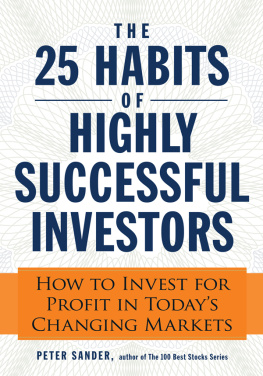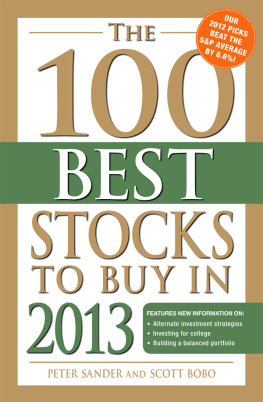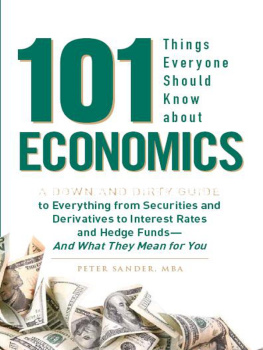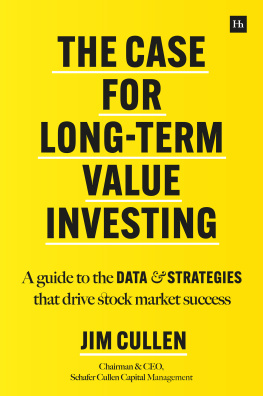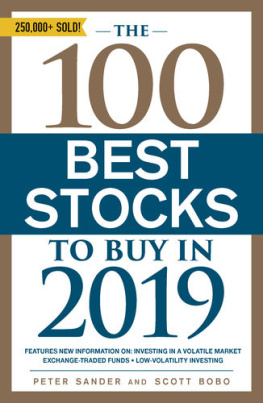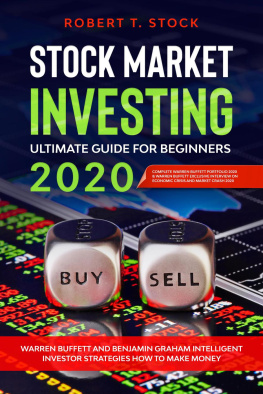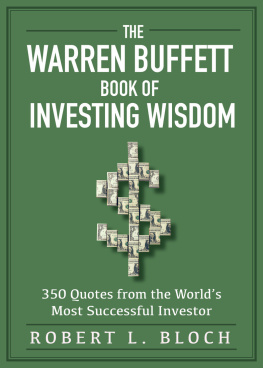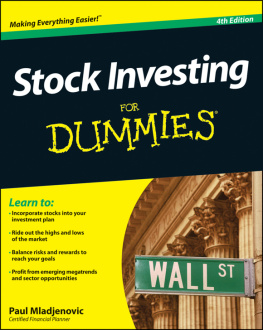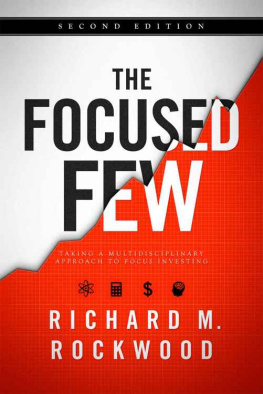INTRODUCTION
Investing Can Be Habit Forming
Motivation is what gets you started. Habit is what keeps you going.
Jim Ryun, former world record holder, one mile run
You have some money to invest. Now what?
Maybe youve been investing actively for years, but youre not that happy with your results. Up one year, way down the next, then sideways in a third year while the markets marched steadily upward.
Isnt it a little like golf or some other precision sport? You play a really good round one day, really bad the next, and a few good holes in an otherwise pretty dreary round the following week. Or cooking. You do a really awesome puffy pancake one Sunday morning; then the next Sunday it does a face plant on the bottom of the pan and you burn it. On the third Sunday its okay, but the kids arent smiling about it anymore.
Sheer instinct in any of these situations makes you want to climb back into the saddle. As in golf or cooking, you would like to improve your investing techniques and intuition. You would like to keep doing it yourselfmostly yourself, anyway. You want to get to the point where you can do it (1) well; (2) with some consistency; and (3) without blowing your mind trying to remember what you did the last time.
Like these other skill-based activities, you approach your investing to (1) achieve or exceed your expectations; (2) be consistent and reliable; and (3) do it without beating your brains out or spending hours of precious personal time on it.
You can argue that good investing is a matter of skill, experience, foresight, time, energy, and a fair dose of luck. All of the above are involved in golf and cooking, and I would submit that theyre all involved in investing. But, especially in todays world (for most of us, anyway) of other priorities, where we cantor dont want tospend the day in front of the computer checking and analyzing investments, good investing requires good habits.
Without good habits, you may find yourself stuck in a pattern of lackluster, inconsistent investing performance. With good habits, youll be right more of the time (notice I didnt say all the time). Youll feel better and sleep better because you did the right things. And youll take less timeor spend moreproductive timeto do it.
In that spirit, I offer you The 25 Habits of Highly Successful Investors.
What Do I Mean by Habit?
When you think of the word habits, what comes first to mind? For most of us, especially prior to the advent of Stephen Coveys 1989 blockbuster, The Seven Habits of Highly Effective People, the word habit probably conjured up the notion of bad habits such as smoking, drinking, cracking your knuckles, or tapping on the dinner table with your fingernails. Habits that are bad for you, annoy others, or some combination of the two. Not a helpful concept for an investing book, right?
The25 Habits of Highly Successful Investors isnt about kicking bad investing habits. It isnt necessarily about turning the things you do already into habits, although Im hopeful that youve been doing at least some of these things right already.
Its really about structuring some of the things you do and have experienced, together with some elements of investing that you probably dont do and havent experienced, into a smart of repeatable exercises that ultimately improve your investing performance. If all goes well, 25 Habits will improve your performance while taking less of your time (or at least investing more of it wisely) and making you more comfortable with the whole investing process.
Straight Out of the Dictionary
I have a habit of using dictionary definitions to highlight terms in titles or concepts I want to discuss. Accordingly, heres the dictionary definition for habit from the Free Dictionary by Farlex:
A habit is:
a. A recurrent, often unconscious pattern of behavior that is acquired through frequent repetition.
b. An established disposition of the mind or character.
As an investor, particularly a time-constrained investor, which most of us are, you should establish a routine. Instead of approaching each investment decision as if youve never made one before, you want a proven method that works for you. You want a method that is repeatable. You want a method that is a process, but is a process simple and clear enough to follow without spending undue time thinking about it. You want to concentrate on the result, and that result is guided by what becomes a pattern of behavior, an established disposition of the mind or charactersomething repeatable over and over without thinking about it too much.
Where Do These Habits Come From?
The chains of habit are generally too small to be felt until they are too strong to be broken.
Samuel Johnson, British author and lexicographer
This book is dedicated to setting forth twenty-five chains of habit I believe make sense for todays informed, long-term, goal-oriented, individual investor. I have culled from my own forty-four years of personal investing experience and the experience of other icons of a habitual, value-oriented investing style, namely Warren Buffett, Peter Lynch, Benjamin Graham, and other followers of that investing school.
Once again, I have thrown in some terms. Long-term, goal-oriented, individual investor, value-oriented investing style. Before going further, we should take a short side trip into what I mean by each of these terms:
Long Term
You hear the term all the timeyetwhat really is the long term for an investor? We hear a lot about buy and hold, and many of us at one time or another have done it. (Or our parents did. Mine bought thirty-five shares of General Motors and stuffed the certificate in a safe deposit box. From that time forward they bought only GM cars. They apparently intended to hold the stock forever.) That was in an era where change came more slowly and industries lasted longerthink about railroads, radio, the auto industrysignificant change took thirty, fifty, even 100 years to occur. Today, industries change much more rapidly. Think about plays in the Internet, PC, restaurant, or entertainment businesses for just a few examples of industries that change rapidly or even run their course in five, ten, or twenty years. Indeed, even stalwart Microsoft has defended against its antitrust suitors on account of its fears about survival, not against competitors, but against technological evolution and eventual demise of the PC. So what is long term? For any given investmentmaybe five to seven years, depending on the industry.

